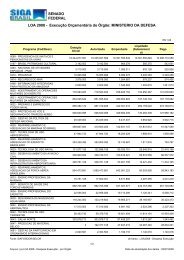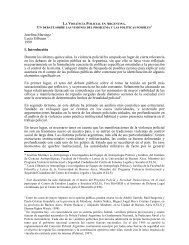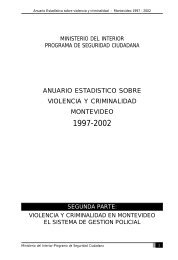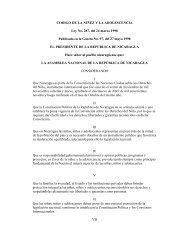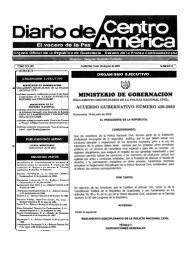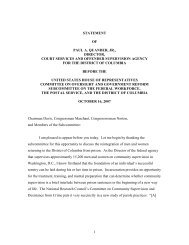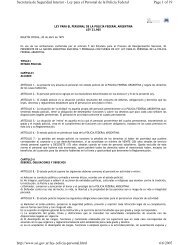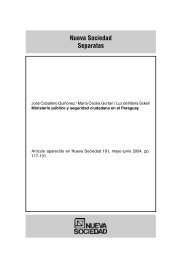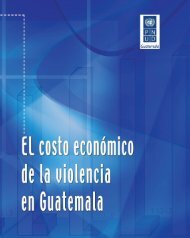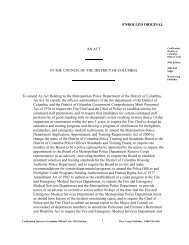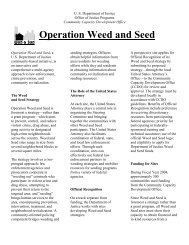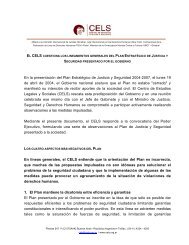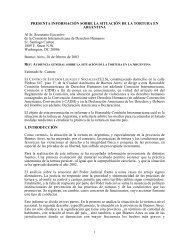Venezuela: The Life and Times of the Party System - Political ...
Venezuela: The Life and Times of the Party System - Political ...
Venezuela: The Life and Times of the Party System - Political ...
You also want an ePaper? Increase the reach of your titles
YUMPU automatically turns print PDFs into web optimized ePapers that Google loves.
typically shared among representatives <strong>of</strong> various parties. Competition within a single group thus<br />
replaced older patterns <strong>of</strong> parallel <strong>and</strong> conflicting organizations.<br />
<strong>The</strong> consensus sought through pacts <strong>and</strong> coalitions was both substantive <strong>and</strong><br />
procedural. 1 Key political forces essentially agreed to disagree—setting difficult <strong>and</strong> potentially<br />
explosive issues aside to concentrate on more manageable areas where limited ‘technical’<br />
solutions could be found. Program restriction was central to <strong>the</strong> process <strong>and</strong> its basic outlines<br />
were enshrined in a second formal agreement, <strong>the</strong> Minimum Program <strong>of</strong> Government. This<br />
Minimum Program embraced a development model based on foreign <strong>and</strong> local private capital,<br />
subsidies to <strong>the</strong> private sector, principles <strong>of</strong> compensation for any l<strong>and</strong> reform, <strong>and</strong> a generally<br />
cautious approach to economic <strong>and</strong> social reform. Pacts <strong>and</strong> agreements were also intended to<br />
defuse potential oppositions: <strong>the</strong> military got amnesties, better equipment, <strong>and</strong> salary upgrades;<br />
<strong>the</strong> Catholic Church got improved legal status, public subsidies, consultation on educational<br />
reform, <strong>and</strong> a general sense <strong>of</strong> security derived from COPEI’s participation in coalition<br />
governments after 1958. Opposition from both Right <strong>and</strong> Left was defeated, <strong>the</strong> first through<br />
successful purges in <strong>the</strong> <strong>of</strong>ficer corps <strong>and</strong> defeat <strong>of</strong> military coups, <strong>and</strong> <strong>the</strong> latter through<br />
marginalization <strong>and</strong> defeat <strong>of</strong> <strong>the</strong> continent’s first big guerrilla insurrection after <strong>the</strong> Cuban<br />
Revolution. 2<br />
To <strong>the</strong> party elites who created it after 1958, democracy was both a goal in itself <strong>and</strong> a<br />
means to o<strong>the</strong>r unspecified ends: an open-ended set <strong>of</strong> arrangements founded on common ways<br />
<strong>of</strong> defining ‘politics’ <strong>and</strong> appropriate political action. But <strong>of</strong> course elites are not all <strong>the</strong>re is to<br />
politics. Without followers, <strong>and</strong> especially without mediating structures to organize <strong>and</strong> mobilize<br />
<strong>the</strong> population, elites are helpless—mere claimants to power <strong>and</strong> legitimacy. It is important,<br />
<strong>the</strong>refore, to acknowledge <strong>the</strong> depth <strong>and</strong> scope <strong>of</strong> popular support for democracy. With rare<br />
exceptions, mass publics followed party leaders, resisting calls to revolution put to <strong>the</strong>m by leftist<br />
parties whose mass base had long ago been taken by AD. Mercier states that,<br />
Looked at from a purely class point <strong>of</strong> view, it could be said that, throughout <strong>the</strong><br />
years 1960-63, <strong>the</strong> working class <strong>and</strong> peasantry were defending a moderate<br />
government against assault from political groups composed, for <strong>the</strong> most part, <strong>of</strong><br />
intellectuals, students, career politicians, <strong>and</strong> people who had come down in <strong>the</strong><br />
world (1969, 106).<br />
After 1958, barriers to participation dropped <strong>and</strong> active political involvement was<br />
encouraged <strong>and</strong> facilitated. Registering to vote is easy in <strong>Venezuela</strong> <strong>and</strong> voting is not only<br />
convenient but also obligatory. A vigorous <strong>and</strong> widespread associational life made participation<br />
1 For details on <strong>Venezuela</strong>n pacts <strong>and</strong> <strong>the</strong>ir larger significance, see Levine (1973, 1985, <strong>and</strong><br />
1988).<br />
2 For discussions <strong>of</strong> <strong>the</strong> meaning <strong>of</strong> <strong>the</strong> guerrilla movement <strong>and</strong> <strong>the</strong> impact <strong>of</strong> its defeat on<br />
political life, in addition to <strong>the</strong> sources cited above, see Levine (1978). For general comments,<br />
see Crowley (1989).



